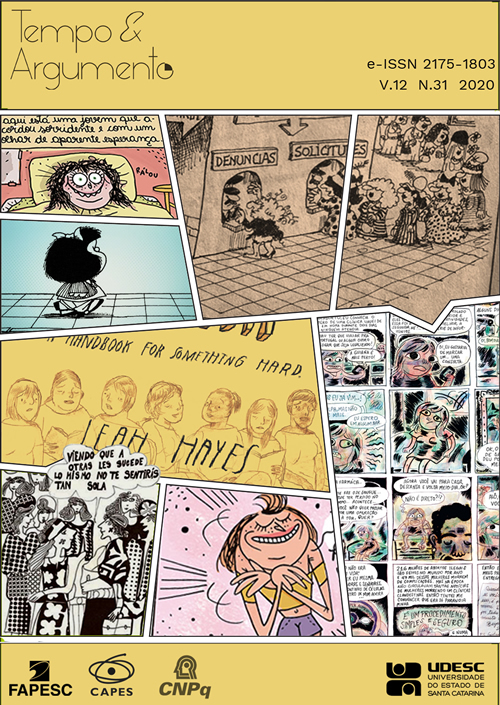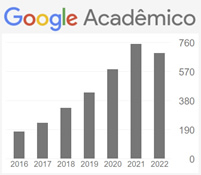Laughing together is the best medicine against the fearful times: criticism and humor in the strips of Thaïs Gualberto and Fabiane Langona (2016-2018)
DOI:
https://doi.org/10.5965/2175180312312020e0108Abstract
The purpose of this text is to reflect about the mechanisms of graphic humor produced between the impeachment of Dilma Rousseff, who was removed from office in 2016, and the end of Michel Temer's government in December 2018. During the survey of the strips of the section Cartoons / Daily Cartoons of Folha de S. Paulo, from December 2015 to the end of 2018, it was possible to observe positions contrary to the coup, challenging the alleged neutrality of the journal. The mixture of elements from the cartoon and the comics gave rise to a hybrid product that sought to explain, laugh and criticize the unusual situations that followed in the fearful national panorama. For this article, only the strips made by women were considered, specifically the comics by Thaïs Gualberto and Fabiane Langona. The idea is to think about the way in which the characters created by these two cartoonists dialogued with feminist issues and the women's agendas of struggle, in the midst of a coup. Strips with themes on the characterizations of the Temer government, the view on Brazil and the politics marked by the electoral campaign and the presidential election of 2018 were analyzed, taking into account the choices of resources and technical procedures that caused the humorous effect. In interpreting the events of the impeachment and the Temer government, the comic artists sought inspiration in the news, in the daily life of cities and in personal experiences, constructing other narratives, from the point of view of women's struggles and resistance practices.
Keywords: Thaïs Gualberto. Fabiane Langona. Graphic Humor. Comics.
Downloads
References
ACEVEDO, Mariela A. Humor como espacio de dialogismo sexogenérico: del canon y el contracanon a la constelación crítica. Revista Ártemis, [João Pessoa], v. 26, n. 1, p. 29-52, jul./dez. 2018.
ALVES, Giovanni. O golpe de 2016 no contexto da crise do capitalismo neoliberal. Blog da Boitempo, [São Paulo], 8 jun. 2016. Disponível em: https://blogdaboitempo.com.br/2016/06/08/o-golpe-de-2016-no-contexto-da-crise-do-capitalismo-neoliberal/. Acesso em: 15 set. 2019.
BAKHTIN, Mikhail. Estética da criação verbal. São Paulo: Martins Fontes, 2003.
BAKHTIN, Mikhail. Problemas da poética de Dostoiévski. Rio de Janeiro: Forense Universitária, 1981.
CAGNIN, Antonio Luiz. Quadrinhos, São Paulo: Criativo, 2014.
CARNEIRO, Sueli. Mulheres em movimento: contribuições do feminismo negro. In: HOLLANDA, Heloisa Buarque de (org.). Pensamento feminista brasileiro: formação e contexto. Rio de Janeiro: Bazar do Tempo, 2019. p. 271-289.
CHARTIER, Roger. História cultural. Lisboa: Difel; Bertrand do Brasil, 1988.
COLLINS, Patrícia Hill. Se perdeu na tradução?: feminismo negro, interseccionalidade e política emancipatória. Parágrafo, [S.l.], v.5, n.1, jan./jun. 2017. p. 6-17.
CRESCÊNCIO, Cintia Lima. É para rir ou para chorar?: o riso feminista brasileiro em tempos de ditadura (1970-1980). História, histórias, Brasília, v. 4, n. 7, 2016.
FEDERICI, Silvia. Calibã e a bruxa: mulheres, corpo e acumulação primitiva. São Paulo: Elefante, 2017.
GUEDES, Linaldo. Ilustradora Paraibana substitui Angeli no jornal Folha de São Paulo. A União, [João Pessoa], 9 maio 2016. Disponível em: http://auniao.pb.gov.br/noticias/ caderno_cultura/ilustradora-paraibana-substitui-angeli-no-jornal-folha-de-sao-paulo. Acesso em: 22 jan. 2020.
JIMÉNEZ, CARLA et al. Mulheres quebram o jejum das ruas no Brasil com manifestações contra Bolsonaro. El país, [S.l.], 30 set. 2018. Eleições 2018. Disponível em: https://brasil.elpais.com/brasil/2018/09/30/politica/1538270819_523141.html. Acesso em: 22 ago. 2019.
MARTIN, Maria. Não é uma banda de indie-rock, é a vanguarda anti-Dilma. El País, [S.l.], 12 dez. 2014. Manifestações anti-Dilma. Disponível em: https://brasil.elpais.com/brasil/2014/12/12/politica/1418403638_389650.html. Acesso em: 15 jan. 2020.
MENDONÇA, Renata. Votação do impeachment revela 5 coisas que você não sabia sobre a Câmara. BBC Brasil, São Paulo, 19 abr. 2016. Disponível em:
https://www.bbc.com/portuguese/noticias/2016/04/160419_impeachment_revela_congresso_rm. Acesso em: 22 jan. 2020.
MILLER, Daniel. Trecos, troços e coisas: estudos antropológicos sobre a cultura material. Rio de Janeiro: Zahar, 2013.
PIRES, Maria da Conceição Francisca. Outras mulheres, outras condutas: feminismo e humor gráfico nos quadrinhos produzidos por mulheres. ArtCultura, Uberlândia, v.21, n.39, p.71-87, jul./dez. 2019.
POLLOCK, Griselda. Visión y diferencia: feminismo, feminidade e historias del arte. Buenos Aires: Fiordo, 2013.
PRANDI, Reginaldo; CARNEIRO, João Luiz. Em nome do Pai: justificativas do voto dos deputados federais evangélicos e não evangélicos na abertura do impeachment de Dilma Rousseff. Revista Brasileira de Ciências Sociais, São Paulo, v. 33, n. 96, e 339603, 2018. Disponível em: http://www.scielo.br/scielo.php?script=sci_arttext&pid=S0102-69092018000100501&lng=en&nrm=iso. Acesso em: 12 mar. 2020.
PRONER, Carol. Golpe branco no Brasil: Dilma alerta na ONU. In: PRONER, Carol; CITTADINO, Gisele; TENENBAUM, Marcio e RAMOS FILHO, Wilson (orgs.). A resistência ao golpe de 2016. Bauru: Canal 6, 2016.
RAMALHOSO, Wellington. Urbanistas dizem que Brasília foi feita para a paz e não para a guerra. Notícias Uol, [S.l.], 14 abr. 2016. Disponível em: https://noticias.uol.com.br/politica/ultimas-noticias/2016/04/14/urbanistas-dizem-que-brasilia-foi-feita-para-a-paz-e-nao-para-a-guerra.htm. Acesso em: 25 jan. 2020.
RAMOS, Beatriz Vargas; MOREIRA, Luiz. Ingredientes de um golpe parlamentar. In: PRONER, Carol; CITTADINO, Gisele; TENENBAUM, Marcio; RAMOS FILHO, Wilson (orgs.). A resistência ao golpe de 2016. Bauru: Canal 6, 2016.
RAMOS, Paulo. A leitura dos quadrinhos. São Paulo: Contexto, 2009.
RIBEIRO, Amanda. Série 'Chiqsland', de Fabiane Langona, estreia como tira diária na Folha. Folha de S. Paulo, São Paulo, 3 out. 2017. Disponível em:
https://www1.folha.uol.com.br/ilustrada/2017/10/1923751-serie-chiqsland-de-fabiane-langona-estreia-como-tira-diaria-na-folha.shtml. Acesso em: 22 jan. 2020.
SALIBA, Elias Thomé. Raízes do riso. São Paulo: Companhia das Letras, 2002.
SPACA, Rafael. Gosto de causar um desconforto. BRAVO!, [São Paulo], 17 ago. 2017. Disponível em: https://medium.com/revista-bravo/ gosto-de-causar-um-desconforto-abb82d6180c7.Acesso em: 22 jan. 2020.
SOARES, Nana. Em números: A violência contra a mulher brasileira. O Estado de S. Paulo, São Paulo, 07 set. 2017. Disponível em: https://emais.estadao.com.br/blogs/ nana-soares/em-numeros-a-violencia-contra-a-mulher-brasileira/. Acesso em: 22 jan. 2020.
VIANA, Rodolfo. Thaïs Gualberto, criadora de 'Olga, a Sexóloga', assume espaço de Angeli. Folha de S. Paulo, São Paulo, 8 maio 2016. Ilustrada. Disponível em:
https://www1.folha.uol.com.br/ilustrada/2016/05/1768707-thais-gualberto-criadora-de-olga-a-sexologa-assume-espaco-de-angeli.shtml. Acesso em: 22 jan. 2020.
WILLIAMS, Raymond. Cultura e materialismo. São Paulo: Editora Unesp, 2011.
Downloads
Published
How to Cite
Issue
Section
License
Copyright (c) 2020 Tempo e Argumento

This work is licensed under a Creative Commons Attribution-NonCommercial 4.0 International License.
The articles published by the magazine are for free use, destined for educational purposes and not commercial. The copyrights are all granted to the magazine. The articles whose authors are identified represent the expressed opinion of its authors and not the official position of the Tempo e Argumento magazine or of the Postgraduate Program in History of the Universidade do Estado de Santa Catarina.




